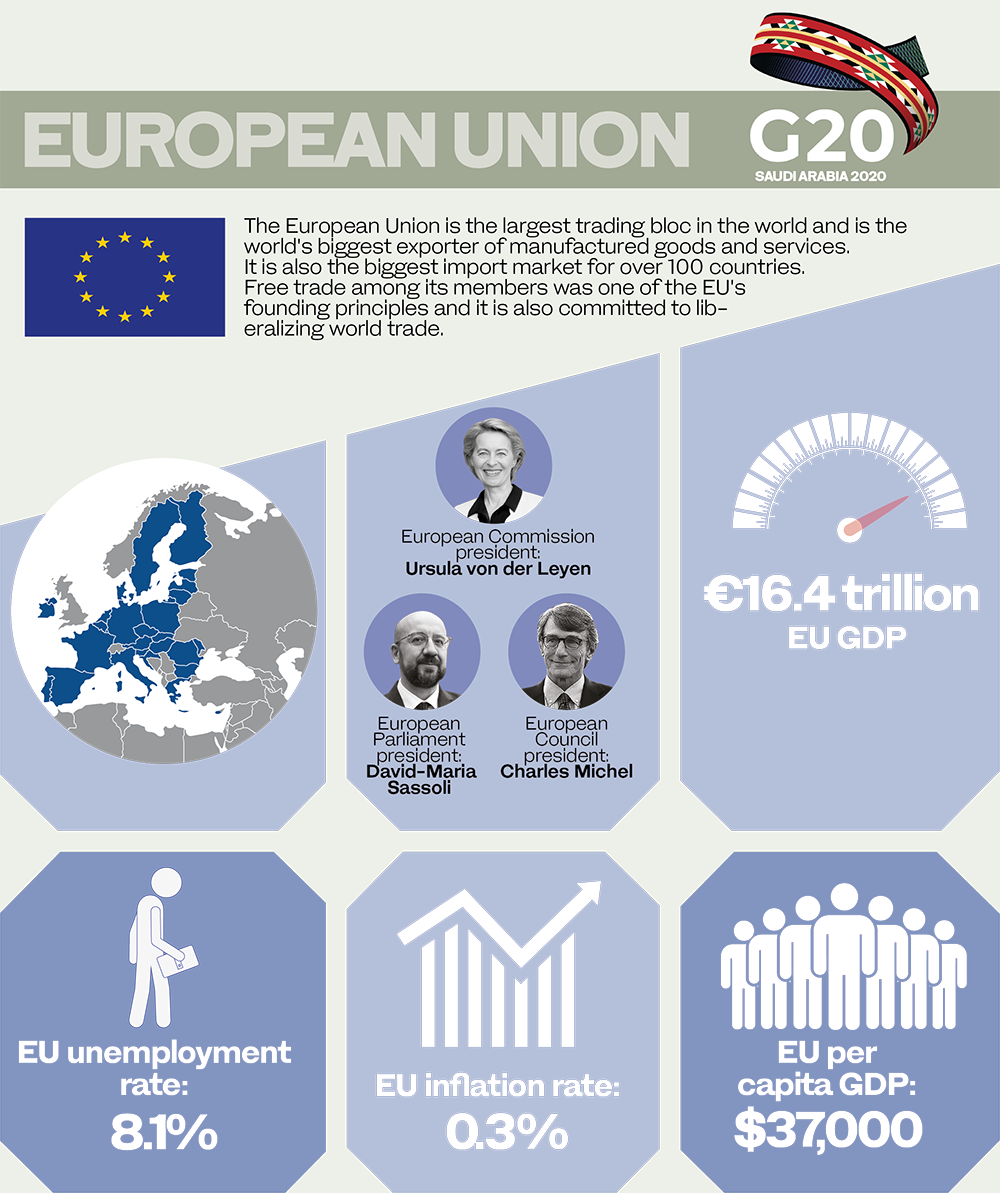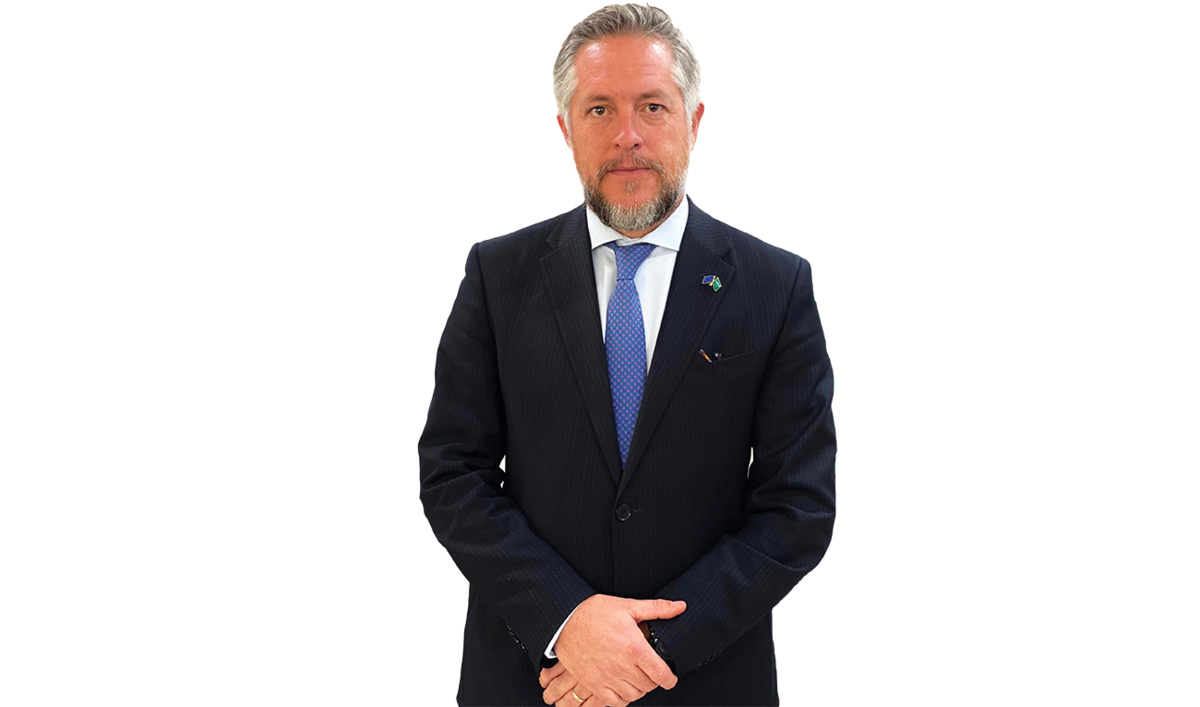RIYADH: Saudi Arabia has proven to be a champion of multilateralism during its G20 presidency, according to the bloc’s ambassador to the Kingdom, Patrick Simonnet.
In an exclusive interview with Arab News, he said that Saudi Arabia had substantial experience in hosting large events and had built on past experiences from the GCC, the OIC and the Arab League summits. However, the G20 was on another scale and included tens of ministerial meetings, and hundreds of workshops and specialized seminars.
“Saudi Arabia’s presidency of the G20 has been very successful in organizing these meetings in light of the challenges posed by the pandemic on logistics and the switch to the virtual realm,” the EU ambassador said.
“More importantly, Saudi Arabia proved to be a champion of multilateralism by using the G20 forum to tackle critical world issues, which have become of upmost importance in the wake of the hardship caused by COVID-19,” he said.
The Kingdom had managed to bring all G20 members to the table to discuss issues where they did not necessarily see eye to eye, such as climate change or energy sustainability, and to come to a consensus so that global work could move forward.
“At a time when multilateralism is under attack, we as the EU have very much valued Saudi efforts in this respect,” the ambassador said.
Under the leadership of King Salman and Crown Prince Mohammed bin Salman, Saudi Arabia was experiencing very important changes and reforms in the economic and social fields, in line with its Vision 2030.
“I am happy that the country’s reform process has also been showcased during the G20,” he said.
On the significance of this G20 presidency during the pandemic and what the G20 could achieve in these difficult times, the ambassador said that Saudi Arabia had reshaped its G20 presidency to adapt it to global challenges.
“Under the Saudi banner of ‘Realizing Opportunities of the 21st Century for All,’ the issues of curbing the impact of the pandemic and engaging in the post-COVID recovery phase have been put at the center of the G20 discussion and in all different strands of work: Economic growth, digitalization, resilience of financial and education systems, debt service suspension, energy access and green recovery” he said.
“Thanks to the committed and pro-active attitude of the different Saudi chairs we now have defined priorities, which will help governments across the G20 countries to better address the needs of their citizens and achieve the necessary post-COVID recovery,” he added.
“Let me give you some examples. First, the trade focus has managed to push the notion of open trade and WTO reform, which will be vital in the recovery phase. Second, the energy agenda fostered energy market stability and security, in line with the Paris Agreement on climate change and sustainable energy commitments.
“Furthermore, this G20 has brought momentum on the digital agenda, as it addressed, for instance, measurement, inclusion and global digital taxation,” he said.
A spotlight had also been placed on health, financial, environmental and development issues, along with new discussions, such as the ones that took place in the Space economy and Artificial Intelligence summits, Simonnet said.

EU Ambassador to Saudi Arabia Patrick Simonnet. (Supplied)
The ambassador said that the G20 provided a platform to enhance relations between the EU and the Kingdom.
“Our new EU leadership have been in regular contact with their Saudi counterparts throughout the year.”
President von der Leyen spoke to King Salman early in the G20 presidency.
“As to our bilateral partnership, I see many avenues for cooperation in terms of political, economic and trade relations,” he said.
Simonnet noted that the EU was the second biggest trading partner of the GCC and its first provider of foreign direct investment.
There was much more that could be done to develop relations, including through a free trade agreement, the negotiations for which needed to be resumed, he said. This would benefit both the EU’s green recovery plan as well as the Saudi Vision 2030 spearheaded by Crown Prince Mohammed bin Salman.
“We also share a common neighborhood and have therefore a mutual interest in peace and stability in the wider region. We are already increasing our level of political consultations and will continue to work together toward a more stable Middle East and Gulf region,” the ambassador said.
“My mission here is also to bring the EU closer to the Saudi people as well as promoting the true image of Saudi Arabia to fellow Europeans,” he said.























